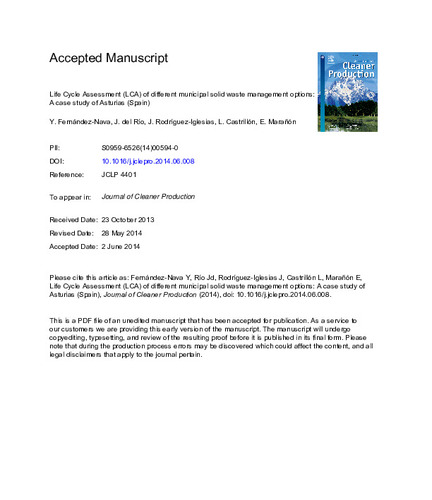Life cycle assessment of different municipal solid waste management options: a case study of Asturias (Spain)
Palabra(s) clave:
Municipal waste management (MWM)
Climate change
Resources
Human health
Fecha de publicación:
Editorial:
Elsevier
Versión del editor:
Citación:
Descripción física:
Resumen:
This paper analyses six strategies for managing the MSW generated in Asturias (Spain) in terms of their environmental impacts applying the Life Cycle Analysis methodology. To this end, the effect of these strategies on Human Health, Ecosystem Quality, Global Warming and Resource Depletion is studied. The analysed management options include direct landfill with recovery of biogas (S-0), direct incineration with energy recovery (S-1), biomethanization of the source-separated organic fraction with direct incineration of the mixed fraction (S-2), biomethanization of the source-separated organic fraction, sorting of the mixed fraction and incineration of the rejected fraction (S-3), biomethanization of the source-separated organic fraction, sorting of the mixed fraction and incineration of the rejected fraction following aerobic stabilization of the organic fraction (S-4) and biomethanization of the source-separated organic fraction, sorting of the mixed fraction and landfill of the rejected following aerobic stabilization of the organic fraction (S-5). The Consortium for Waste Management (COGERSA) provide data regarding on transport and collection of waste and consumption of energy, water, oil and reagents at each processes. The results obtained suggest that Scenario S-3 has the least impact on the analysed damage categories while the scenarios including landfilling produces the greatest impact in all the categories analysed. Regarding involved processes in studied scenarios, the transport produces a significant impact in the environment, biomethanization contributes to reducing the impact in all the damage categories and incineration adversely affects the categories of Human Health and Climate Change, but helps to reduce damage in the Resources category
This paper analyses six strategies for managing the MSW generated in Asturias (Spain) in terms of their environmental impacts applying the Life Cycle Analysis methodology. To this end, the effect of these strategies on Human Health, Ecosystem Quality, Global Warming and Resource Depletion is studied. The analysed management options include direct landfill with recovery of biogas (S-0), direct incineration with energy recovery (S-1), biomethanization of the source-separated organic fraction with direct incineration of the mixed fraction (S-2), biomethanization of the source-separated organic fraction, sorting of the mixed fraction and incineration of the rejected fraction (S-3), biomethanization of the source-separated organic fraction, sorting of the mixed fraction and incineration of the rejected fraction following aerobic stabilization of the organic fraction (S-4) and biomethanization of the source-separated organic fraction, sorting of the mixed fraction and landfill of the rejected following aerobic stabilization of the organic fraction (S-5). The Consortium for Waste Management (COGERSA) provide data regarding on transport and collection of waste and consumption of energy, water, oil and reagents at each processes. The results obtained suggest that Scenario S-3 has the least impact on the analysed damage categories while the scenarios including landfilling produces the greatest impact in all the categories analysed. Regarding involved processes in studied scenarios, the transport produces a significant impact in the environment, biomethanization contributes to reducing the impact in all the damage categories and incineration adversely affects the categories of Human Health and Climate Change, but helps to reduce damage in the Resources category
ISSN:
Patrocinado por:
Foundation for Applied Research and Technology (FICYT) [PC-06-040]; Consortium for Solid Waste Management in Asturias (COGERSA) [PC-06-040, FUO-EM-147-11]
Colecciones
- Artículos [37548]
- Ingeniería Química y Tecnología del Medio Ambiente [354]
Ficheros en el ítem





